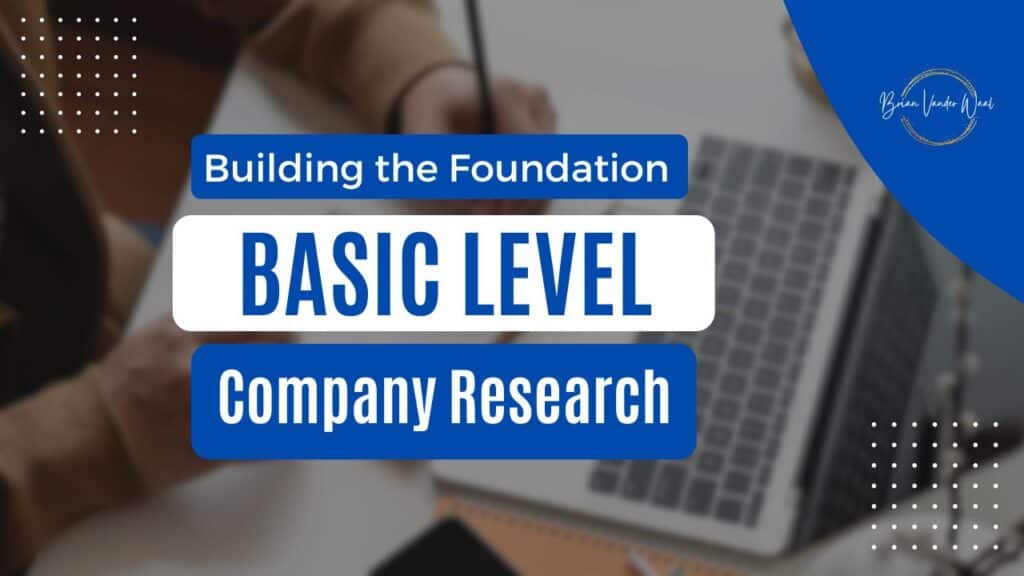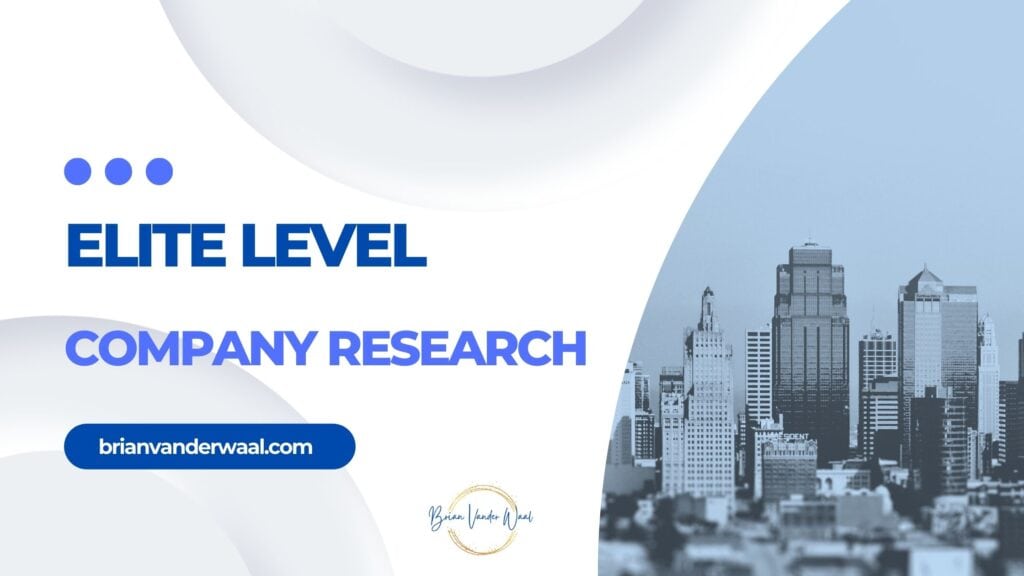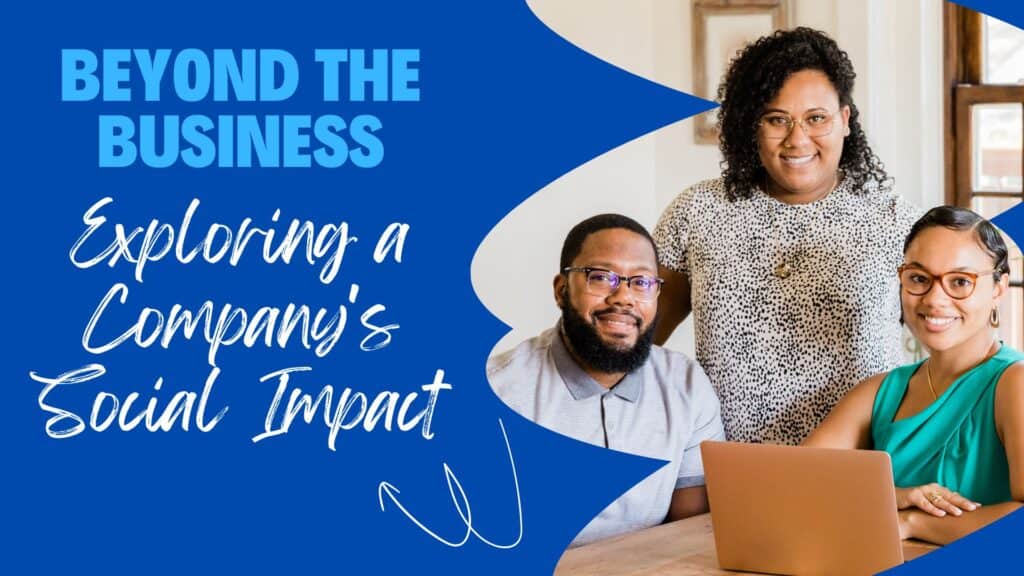Imagine entering a job interview knowing exactly what the company stands for, how it operates, and why it excites you. That’s the power of thorough research. Studies show it pays off: 80% of hiring managers view a candidate’s research as a sign of enthusiasm and preparation, and well-researched candidates are 60% more likely to land a job offer. This blog provides a unique perspective on how to research a company for an interview.
Learn secret strategies not found elsewhere. (Hint: take particular note of the strategies mentioned in the section called ELITE LEVEL Company Research). Dig deeper than just the surface to find details that impress your interviewer. See if the company truly matches your career goals.
Who am I, and why should you trust my interview tips?
My name is Brian Vander Waal, and I have invested more than 19 years in the employment and careers sector. As a Career Coach, I have supported thousands of clients with interview prep, which has helped them land their dream jobs. Due to my expertise and experience, I know what it takes to help people succeed in interviews.
Importance of Researching a Company Before an Interview
Researching a company before a job interview is crucial to securing your dream job. Understanding what a company stands for, how it operates, and what its employees say about it is particularly important. Moreover, this preparation showcases your knowledge and enthusiasm to the hiring manager.
Studying various aspects of the potential employer, including the company culture, mission statement, and product offerings, can help job seekers gain valuable insights. It can also help them impress the interviewer and determine if the company is the right fit. I recommend using platforms like LinkedIn, Google News, and Glassdoor for this. These platforms offer a plethora of information, ranging from press releases to current employee reviews.
A thorough analysis of a company’s website is also crucial. Particularly important are the “about us” and “career” pages and the blog to understand the company’s thought leadership and priorities. Further, analyzing the company’s social media profiles and annual reports can offer a comprehensive view. This analysis provides insights into the company’s history, financial health, and overall reputation within the industry.
BASIC LEVEL Company Research: Building the Foundation

Conducting research on the company before a job interview starts with gathering basic information about the company. Understanding the company is crucial to laying the groundwork for a successful interview. Gather vital details like its history (including when it was founded), structure, size (number of employees), and headquarters location.
According to Glassdoor, a surprising 70% of applicants fail to research even this basic information. This is particularly shocking as this information is often readily available on the company website or within the job description. So there is no excuse for not carrying out at least a basic level of research.
Like many of my clients, you may ask why it matters. The reason why researching basic information about the company is so crucial is because knowing these specifics allows you to:
- Contextualise the company’s operations within its industry: Understanding its age and size gives you a sense of its experience and market position.
- Ask relevant questions at your interview: Demonstrating your knowledge about the company’s background can spark engaging conversation and showcase your genuine interest.
- Identify recent developments: Look for news articles or press releases mentioning mergers, acquisitions, or new product launches. This reveals the company’s growth trajectory and potential future direction.
By gathering this fundamental information, you’ll be well on your way to building a solid foundation for your interview preparation.
Understanding the Company Culture
Firstly, understanding the company culture involves more than just knowing about its casual Fridays or team-building activities. It’s about grasping the organisation’s values, communication styles, and overall working environment. By researching employee testimonials or company events, you can gain insights into:
- How the company values its employees
- Fosters collaboration
- Promotes work-life balance.
Understanding the Company’s Mission and Values
Secondly, the company’s mission statement encapsulates its purpose and goals, providing a roadmap for future endeavours. During the interview, you can demonstrate your dedication to the mission by aligning your values with the company’s. Understanding these foundational principles also helps you gauge the company’s long-term aspirations and potential for growth.
Researching the Company’s Service Offer or Product Line
Thirdly, thoroughly exploring the company’s products or services offers insights into its core business functions. In particular, you can learn how it positions itself in the market. Understanding the value the company provides to its clients or customers is crucial for success in your interview. Incorporating this knowledge into your interview answers showcases your interest in contributing to its success.
Researching What Type of Clients or Customers the Company Serves
Fourthly, examine the demographics and needs of the clients or customers the company caters to. This will give you a deeper understanding of its target market. By understanding the company’s clientele, you can tailor your responses to interview questions to highlight how your skills and experience directly address the needs of their customer base. In doing so, you will demonstrate your potential value and contribution to their success.
Examining the Financial Health of the Company
Fifth, analyse the company’s financial health through sources like annual reports or financial news. Doing this can provide insights into its stability and growth potential. Moreover, understanding the company’s financial standing demonstrates your awareness of its current positioning in the market. As a result, you can address any related questions confidently during the interview.
Understand the Company’s Hiring Process
Finally, researching the company’s hiring process equips you with knowledge about what to expect during the recruitment process. For example, various stages of interviews, assessments, or evaluations may exist. Further, familiarising yourself with the interview process and its steps can help you prepare adequately. This will help you showcase your alignment with the company’s preferred hiring practices.
ADVANCED LEVEL Company Research for an Interview

When preparing for a job interview, carrying out advanced research can set you apart from other candidates. Beyond the basic information, advanced research involves scrutinising various sources to understand the company comprehensively. Below are some advanced research techniques to help you find success in your interview.
Reading News Stories About the Company
Reading current news stories about the company can provide valuable insights into its:
- Recent activities
- Critical initiatives
- Industry trends
- Achievements
- Challenges
- Positioning within the market
- Stock performance
- Overall market presence.
Thus, news articles offer you a well-rounded perspective to discuss during the interview.
Remaining informed about the company’s latest developments, product launches, and industry recognitions also demonstrates your proactive approach to staying current. Further, it shows your interest and dedication to understanding the company’s growth trajectory and market presence.
Exploring Company Reviews on Platforms like Glassdoor
Exploring employee reviews on platforms like Glassdoor can offer candid insights into:
- The company’s work culture
- Management style
- Employee satisfaction levels
- Potential areas of improvement.
One of the best ways to understand what it would be like to work for a company is to read what current and past employees say about the company. Employee reviews can help you anticipate what to expect if you join the organisation. Further, they can help you tailor your responses at your interview to align with the company’s priorities.
Exploring Customer Reviews on Platforms like Trustpilot
Look at what customers say about the company’s products and services on platforms like Trustpilot, Google Reviews, or industry forums.
Exploring the Company’s Social Media Accounts
Engaging with the company’s social media accounts can provide a glimpse into its branding, corporate communications, company events, and employee engagements. Examples of platforms that companies are on include:
- YouTube
- X
- TikTok
- Snapchat
- Telegram
- Quora
- Kuaishou
- Sina Weibo
- Discord
- Twitch
- Tumblr
- Threads by Instagram
The popularity of some of the above platforms does vary by region. So, some platforms with more users may have less user engagement in your region. As a result, local businesses and organisations may be less likely to be on those platforms. So, you should be aware of which platforms are popular in your area of the world.
Following the company’s social media presence lets you stay updated on its latest announcements, initiatives, and industry involvement. Having an awareness of this information allows you to showcase your interest and knowledge during the interview.
For example, LinkedIn is valuable for learning about a company’s corporate culture, key personnel, recent updates, and industry affiliations. By exploring the company’s LinkedIn profile, you can gain valuable insights that inform your understanding of its operations and values. If possible, also contact employees via LinkedIn for a quick chat to get an insider’s point of view.
ELITE LEVEL Company Research

Engaging with Social Media Listening Tools
While platforms like LinkedIn and company websites offer valuable insights, social media listening tools provide elite-level insights. These tools offer a deeper understanding of how companies interact with their audience and how customers perceive their brand. This niche insight offers an advanced strategy that has led most of my clients to interview success. Therefore, it’s essential not to overlook this tip! Examples of social media listening tools include Brandwatch and Sprout Social.
Three ways of utilizing Social Media Listening Tools
1. You can monitor the company’s social media conversations in real-time
Use Social Media Listening tools to analyse how the company engages with customers on social media platforms in real-time. I have listed examples of these social media platforms above.
2. You can gain insights into brand sentiment
Leverage these tools to analyse the overall sentiment and tone surrounding the company. You can do this by identifying positive mentions, negative feedback, and areas for improvement. This reveals how customers and the public perceive the brand.
3. The tool can help you to understand customer perception
Utilise Social Media Listening Tools to understand the common themes and concerns discussed online. Discover customer opinions and experiences with the company’s products or services. With this knowledge, you will be empowered to anticipate potential challenges and tailor your responses during the interview.
Three Benefits of Utilising Social Media Listening Tools
1. Uncover hidden gems
Social media conversations often reveal valuable information that is not readily available on the company website.
2. Identify potential red flags
Negative customer experiences or frequent complaints can provide insights into potential challenges within the company.
3. Demonstrate a well-rounded understanding
By referencing insights gleaned from social listening tools during your interview, you showcase:
- A comprehensive understanding of the company that goes beyond surface-level knowledge
- A genuine interest in its customer perspective
- A thorough approach to researching the company.
Demonstrating a well-rounded understanding of the company is guaranteed to impress the interviewer. In particular, if you relate it to your skills, experience, values and interests.
Additional Pro Tips
1. Look for recurring themes
When analysing social media conversations, identify customers’ recurring topics or concerns.
2. Correlate findings with your research
Compare the sentiment you discover on social media with the information you gathered from other sources. This paints a more holistic picture of the company and shows your ability to draw conclusions from multiple sources.
3. Focus
While these tools provide valuable data, prioritise your research by focusing on the information most relevant to the job you are applying for.
4. Free trials
Many social media listening tools allow you to experiment with their features before committing to a paid subscription. Also, some have a free plan, which is a scaled-down version of their paid plan.
Case Study – Success Using Social Media Listening Tools for Company Research
I introduced this technique of using social media listening tools for company research to a client in one of my coaching sessions. Firstly, he used it to identify a notable trend in customer feedback. The feedback related to a specific pain point that the company had yet to address. Secondly, during his interview, my client skillfully demonstrated his knowledge and understanding of the company’s pain points. He did this by acknowledging this challenge and articulating how his skills and experience could contribute to finding a solution. As a result, the hiring manager was thoroughly impressed, leading her to extend a job offer on the spot.
Summary – Why Social Media Listening Tools are So Valuable for Company Research
You will better understand the company’s brand image by incorporating social media listening tools into your research strategy. You will also gain deeper insight into its relationship with its audience. As a result, you will present yourself as someone who can:
- Stay informed
- Think critically
- Contribute valuable insights beyond the readily available information.
Further, it will enable you to ask insightful questions during your interview.
Industry Reports for Market Intelligence
Industry reports offer valuable insights beyond what a company might directly disclose on its website, social media, or press releases. Look for reports from reputable sources that analyse the industry in which the company operates. Industry reports are a valuable resource for interview research.
Industry reports provide a wealth of information, including:
- Market size and growth projections: Industry reports will help you understand the industry’s overall health and potential for future expansion. During the interview, this knowledge will also position you to ask informed questions about the company’s competitive strategies.
- Competitive landscape: Identify the company’s key competitors and understand their strengths and weaknesses. With this knowledge, you can highlight how your skills and experience can contribute to the company’s competitive edge.
- Anticipate Emerging trends: Uncover upcoming industry developments, technological advancements and potential challenges or opportunities. Demonstrating awareness of the forthcoming challenges and opportunities within the industry showcases your forward-thinking approach and potential value to the company.
By incorporating industry reports into your research, you demonstrate:
- An understanding of the company’s position within the broader market.
- A keen awareness of the broader market dynamics
- Your ability to think strategically.
This can set you apart from other candidates solely focusing on the company. Investing time in analysing industry reports empowers you to go beyond the surface level. Moreover, you will present yourself as a candidate with a strategic understanding of the company’s position within the broader market.
Gaining the Insider Perspective: Podcasts for Authentic Insights
Then move beyond the traditional research methods and take it a step further. Tap into the wealth of information available through company podcasts and interviews with key personnel. Podcasts and interviews often feature a more conversational format, allowing leaders to share personal experiences and anecdotes. This storytelling approach can connect deeply to the company’s culture and the individuals who drive its success.
Based on my advice, one of my clients recently listened to a podcast about a company she was applying for a role with. In this particular podcast, the CEO discussed a recent company challenge and the innovative solution they implemented. This firsthand account gave her a richer understanding of the company’s problem-solving approach and commitment to overcoming obstacles. This also helped her decide whether to apply for the company and in her interview.
Many companies utilise podcasts and interviews with key personnel to share their stories, goals, and perspectives. Seek out content featuring CEOs, company founders, or department heads. These resources offer a unique opportunity to:
1. Hear directly from the company
Podcasts and interviews often feature executives, team members, or industry experts discussing the company’s mission and future goals. This firsthand perspective provides valuable insights that might not be readily available elsewhere.
2. Gain a firsthand perspective on the company’s personality and culture
The tone, language, and overall atmosphere of podcasts and interviews can reveal much about the company culture. You can also get a sense of the company’s values and communication style. Further, listening to company leaders discuss their vision, values, and daily operations provides a more authentic perspective on the work environment. Sometimes, you can hear directly from employees about their experiences and daily work environment as well.
3. Understand the leadership style and approach
Gain insights into how decisions are made, how the company fosters collaboration and the overall management approach. Listening to interviews with key leaders can also provide insights into their management philosophy, strategic vision, and the company’s overall direction. Further, you can learn about their approach to employee engagement.
4. Discover the company’s goals and aspirations
Hearing leaders discuss their plans, challenges, and aspirations can reveal their commitment to innovation and growth. Bringing this knowledge into your interview will enable you to connect with the interviewer on a deeper level and showcase your potential fit within the organisation.
Beyond the Business: Exploring a Company’s Social Impact

While understanding a company’s core business is crucial, a deeper dive into its social impact paints a more complete picture. Look for their involvement in initiatives that address social responsibility, environmental practices, or local partnerships.
In today’s world, social responsibility is no longer a side note; it’s a core aspect of a company’s identity. Researching the company’s impact on the community goes beyond simply learning about its products or services. Look for their involvement in initiatives like:
- Volunteer programs: Do they encourage employees to give back to the community?
- Environmental practices: Do they have sustainable manufacturing processes or eco-friendly product lines?
- Local partnerships: Do they collaborate with local organisations to address community needs?
By demonstrating your awareness of a company’s social efforts, you showcase your values and signal your potential fit within the organisation.
Incorporate Company Research Into Your Interview Answers

Why You Should Prepare for Interview Questions Related to Your Industry
Researching common interview questions for the industry allows you to anticipate and prepare thoughtful responses. As a result, you can tailor your answers to highlight your skills and experience effectively. Thus you will showcase your alignment with the role and company expectations.
Why You Should Integrate Company Research Into Your Interview Answers
Integrating details about the company’s background, culture, and recent achievements into your interview responses is not just impressive; it’s essential. Studies from Glassdoor show that 72% of interviewers view a candidate’s inability to answer basic company-related questions negatively.
How You Can Demonstrate Your Research and Commitment
Quantifying your impact
Relate your company research and your knowledge of skills gaps they have to your quantifiable achievements. Use numbers and data to showcase your tangible value when mentioning your past achievements. For example, instead of simply stating “increased sales,” quantify it by saying, “implemented a new marketing strategy that resulted in a 21% increase in year-over-year sales.”
Weaving a narrative
Don’t just list facts; craft a compelling story that connects your research to your skills and experience. In short, link your achievements to the company’s goals and challenges. Further, highlight how your problem-solving abilities align with their needs. This will set you apart from other candidates and increase your chances of securing the job.
Relate the Company’s Mission and Values to Your Values
Drawing parallels between your values and those of the company during the interview helps establish a connection and alignment. You also convey a strong cultural fit by articulating how your beliefs align with the company’s mission. Further, you demonstrate a genuine interest in contributing to its success.
Link the Company’s Needs and Pain Points to Your Skills & Achievements
You present yourself as a valuable asset by addressing how your skills and past achievements directly fulfil the company’s identified needs and alleviate pain points. Moreover, demonstrating a clear understanding of the company’s challenges and showcasing how you can provide solutions can make a compelling case for your candidacy.
Conclusion: How to Research a Company for an Interview
You’ve unlocked the secrets to research mastery and are now ready to dominate your next interview.
Here’s a summary of what we discussed:
- Tailor your research: Make it laser-focused on the specific company and position you’re targeting.
- Go beyond the obvious: Don’t just skim the surface. Dive deep into industry reports, social media conversations, and even employee reviews to uncover hidden insights.
- Craft a compelling story: Weave your research findings into your interview responses, showcasing how your skills and experience perfectly align with the company’s needs.
- Ask insightful questions: Fuel your curiosity with your research and formulate questions that demonstrate your genuine interest and critical thinking.
Following these steps will transform you from a nervous candidate into a confident interview pro. Landing your dream job won’t be a distant dream; it’ll be the grand prize you confidently claim.
Remember, thorough research is your secret weapon. So, unleash your inner detective and get ready to impress!
Frequently Asked Questions (FAQs):
Before my interview, what steps can I take to learn more about a company?
One of the most crucial steps during your job search is thoroughly researching the company you’re interviewing with. In my guide to researching a company above, I suggested that you start with the company’s official website, particularly the “about us” page. The company website will give you an idea of the company’s mission, history, and key players within an organization. Websites like Crunchbase can also offer insights into recent news and investor relations, especially for larger companies. For more tips, read my blog above.
What are the best sources to research companies?
The best sources for company research include:
1. The company’s website, where you can learn about its mission statement, culture, and products or services.
2. LinkedIn provides a window into the company’s current activities and profiles of current employees.
3. Glassdoor offers company reviews and can give a glimpse into the interview process and the company culture from the perspective of employees or past job seekers.
4. Google News and Crunchbase are excellent sources for recent updates and press releases and for understanding a company’s history and financial health.
5. Annual reports comprehensively examine the company’s financial performance and strategic direction.
6. Social Media Listening Tools can help you analyse customer feedback, pain points and give you a deeper insight into its relationship with its audience.
7. Podcasts and Interviews can help you connect more deeply to the company’s culture and the individuals who drive its success.
How will it benefit me to research a company before my interview?
Engaging in such investigations will not only help you understand the company before your interview but will also provide valuable insights into what might be expected of you should you join the team. Moreover, researching the company online and its recent news aids in presenting yourself as a well-prepared and highly interested candidate, enhancing your chances of securing the job.
How can I utilize online resources to research a company’s personnel and gain insights into their culture and potential interview questions?
During this pre-interview phase, find information on employee bios, which can help identify who the company values. Tools such as LinkedIn can be instrumental in understanding how you might fit within the company’s dynamics. These tools can also help you understand who the key players are.
Further, knowing a bit about the person interviewing you can help tailor your questions. As a result, you will stand out as an informed and interested candidate.
Finally, it is important to remember that employers are looking for candidates who show initiative. Showing that you’ve taken the time to research their company shows your initiative.







